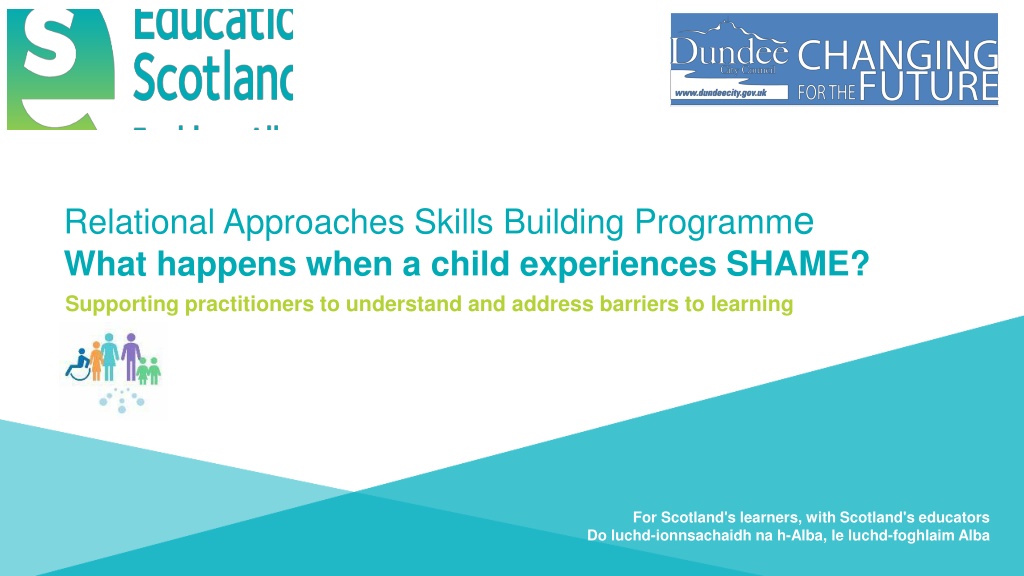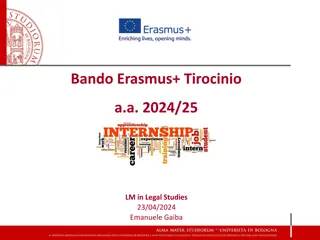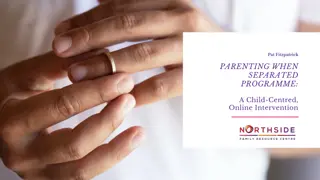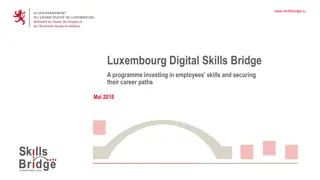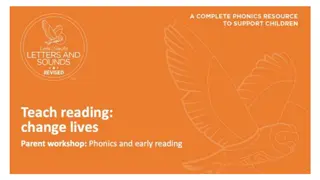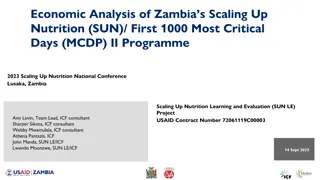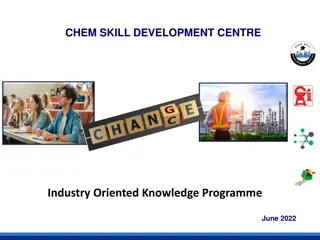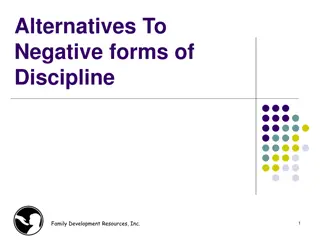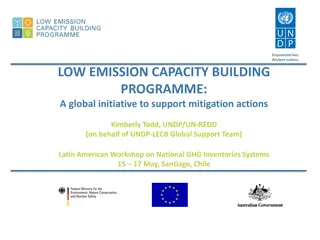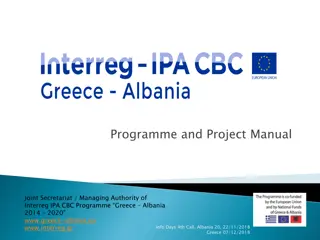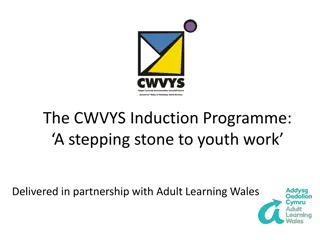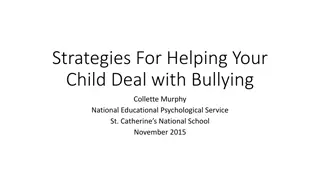Understanding the Impact of Shame on Children: A Skills Building Programme
Shame is a powerful and universal emotion that can have detrimental effects on children's behavior and emotional well-being. This programme aims to support practitioners in recognizing and addressing shame to help create a more positive learning environment for Scotland's learners. Through understanding the difference between shame and guilt, educators can promote healthy coping mechanisms and foster a sense of belonging and acceptance in children.
Download Presentation

Please find below an Image/Link to download the presentation.
The content on the website is provided AS IS for your information and personal use only. It may not be sold, licensed, or shared on other websites without obtaining consent from the author. Download presentation by click this link. If you encounter any issues during the download, it is possible that the publisher has removed the file from their server.
E N D
Presentation Transcript
Relational Approaches Skills Building Programme What happens when a child experiencesSHAME? Supporting practitioners to understand and address barriers to learning For Scotland's learners, with Scotland's educators For Scotland's learners, with Scotland's educators Do luchd-ionnsachaidh na h-Alba, le luchd-foghlaim Alba Skills Building Programme Dundee Changing for the Future
What happens when a child experiences SHAME? Behaviour we see: Withdrawal (socially withdraws, runs away, disengages ) Aggression (towards others or themselves) Uses avoidance strategies (denial, escapism, ) Emotionally shutting down or dissociation Skills Building Programme For Scotland's learners, with Scotland's educators Dundee Changing for the Future
Bren Brown Understanding Shame Shame is universal and is one of the most primitive emotions we experience Shame is the intensely painful feeling or experience of believing that we are flawed and therefore unworthy of love - Brown, Daring Greatly is the feeling of extreme embarrassment and humiliation is the fear of disconnection the fear that something we have done or failed to do makes us unworthy of connection Skills Building Programme For Scotland's learners, with Scotland's educators Dundee Changing for the Future
What is shame? When shame is experienced, it functions as an urgent signal that danger is here: the danger of rejection, failure, exposure and abandonment. It is an experience rooted in interpersonal relationships. It threatens the very experience of being alive and needing to belong, be loved and accepted. de Thierry (2019) If not comforted by an adult, the children can experience significant fear, stress and anxiety leading to harmful coping mechanisms and enduring toxic stress. Skills Building Programme For Scotland's learners, with Scotland's educators Dundee Changing for the Future
Guilt v Shame Skills Building Programme For Scotland's learners, with Scotland's educators Dundee Changing for the Future
Shame vs Guilt Shame I am bad Guilt I feel bad Can be destructive leading to lashing out, withdrawing, self-destructive behaviours Can help us change our behaviour in a positive way if we can accept responsibility Skills Building Programme For Scotland's learners, with Scotland's educators Dundee Changing for the Future
Different levels of shame Type 1 normal shame Child experiences a short burst of shame but is quickly comforted by the adult. Experience will stay in conscious memory but child will: be able to overcome the unpleasant feelings relatively soon after the event. often aim to avoid the same discomfort in the future but this endeavour is often a very conscious and cognitive one. Skills Building Programme For Scotland's learners, with Scotland's educators Dundee Changing for the Future
Different levels of shame Type 2 : Unhealthy shame Child experiences shame regularly and their emotional needs are not always met by an adult. Early experiences of unhealthy shame: are often remembered at subconscious level can cause anxiety about being abandoned, rejected and not being good enough can lead to different behaviours and coping mechanisms eg withdrawing, lying, or being a perfectionist Skills Building Programme For Scotland's learners, with Scotland's educators Dundee Changing for the Future
Different levels of shame Level 3 : Toxic shame Difference between type 2 and type 3 is marked by the length of time and the degree of humiliation and fear experienced The more frightened, humiliated, and unprotected the child feels, the further down they have to push the unbearable feelings into the subconscious These feelings are then harder to reflect on and make sense of The child develops a core sense of shame and complex coping mechanisms also become part of their identity Skills Building Programme For Scotland's learners, with Scotland's educators Dundee Changing for the Future
Sources of shame Behaviour techniques which use shame and fear for compliance Abuse, neglect, secret family problems Online peer pressure Being compared Having your needs dismissed Self-blame Expectation of being perfect Adolescence Confusing boundaries Skills Building Programme For Scotland's learners, with Scotland's educators Dundee Changing for the Future
Shame reactions (compass of shame) WITHDRAWAL Isolation Running away Hiding face Disengagement ATTACK SELF ATTACK OTHER Shouting Blame others / Not just me Aggression / Violence Negative self-talk Self-harm Feeling of no control AVOIDANCE Denial Masking the pain Self-medicating Sex, drugs, rock and roll From Nathanson, 1992 Skills Building Programme For Scotland's learners, with Scotland's educators Dundee Changing for the Future
Where individual wrong-doers are confronted within a continuum of respect and support, then a process of REINTEGRATION can begin. Braithwaite (1989) Braithwaite s Hypothesis Re-intregrative Shaming Disintegrative Shaming Acknowledges the intrinsic worth of the person Labels and stigmatises the individual as well and their potential contribution to society as the behaviour Ostracises or excludes the individual from Separates the deed from doer -> their wider community I like you but not your behaviour No need to augment shame it happens Degrades the individual and affects their social naturally and should be managed with respect interactions. and support Often leads to repetition of the unacceptable behaviour Skills Building Programme For Scotland's learners, with Scotland's educators Dundee Changing for the Future
Shame, resilience and healing Ensure our schools are shame-informed Create a nurturing ethos which prioritises positive relationships and emotional safety Provide regular emotional connection with the child Share vulnerabilities and make it safe to make mistakes Model self-compassion Separate out the problem behaviours from the child Skills Building Programme For Scotland's learners, with Scotland's educators Dundee Changing for the Future
The importance of language Repair shame experiences through kindness and empathy Include use of restorative language/conversations Reinforce that your relationship isn t impacted when things go wrong, and that things can be resolved most easily by going over them together. Use both verbal and nonverbal language to communicate respect and support. Help the child notice and speak about how shame feels (physically and emotionally) -use the Emotion Sensation Feeling Wheel if the child needs support to identify feelings and how the physical sensations associated with them Help the child understand how shame may have helped them in the past but may be a hindrance now Skills Building Programme For Scotland's learners, with Scotland's educators Dundee Changing for the Future
How do we manage shame? WITHDRAWAL ATTACK SELF ReflectionActivity (individually or as a group): ATTACK OTHER What do we need when we experience shame? What can we do to support a child or young person whom we suspect is being affected by shame? AVOIDANCE Nathanson, 1992 Factors for consideration: Environmental Social Personal Skills Building Programme For Scotland's learners, with Scotland's educators Dundee Changing for the Future
Further reading SHAME Information Note Skills Building Programme For Scotland's learners, with Scotland's educators Dundee Changing for the Future
Education Scotland Denholm House Almondvale Business Park Almondvale Way Livingston EH54 6GA T +44 (0)131 244 5000 E enquiries@educationscotland.gsi.gov.uk For Scotland's learners, with Scotland's educators Skills Building Programme For Scotland's learners, with Scotland's educators Dundee Changing for the Future
